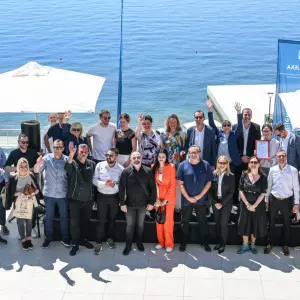The number of requests for foreign workers in 2022 almost correlates with the current number of unemployed in Croatia, he pointed out in the Hrvatski radio show 'In the First Network' Antonio Matkovic from the Institute for Labor Market Development.
Last year, 130.000 requests for foreign workers were submitted. It is obvious, he commented, that the economy needs labor, but it cannot be found in our market.
Director of the Croatian Employment Service, Ante Lončar, confirmed that there are currently a large number of vacancies, around 20.000. During the tourist season, the number rises to approximately 30.000.
Occupations of the future
Stjepan Lakušić, rector of the University of Zagreb, added that universities have their own economic councils in order to harmonize study programs with the needs of the labor market.
He pointed out that experts in Croatia have a broad education, which is why he believes that they can more easily fit into the labor market and occupations that the future brings.
"Universities are the ones who must indicate, together with the economy, which fields, technologies, and what will be needed in the futureLakušić said.
He emphasized that it is necessary for all those who complete higher education, colleges, to be satisfied in the end when they complete such programs, because that is the only way, he emphasizes, that they can be ready for the future that awaits them.
He also believes that, after the completion of university programs, people need to be provided with jobs and working conditions in Croatia, with the aim of minimizing the outflow of the workforce.
Some ambassadors know to ask him why Croatia does not accept more foreign students, he said, and added that this week he will present the strategy for the Borongaj campus.
Fall in unemployment
The director of the Croatian Employment Service states that the situation on the labor market is good. Since 2016, a constant decline in unemployment has been visible. At that time, namely, there were 265.000 unemployed, and today there are 109.000, Lončar revealed.
"Today, there is an increase in unemployment, because the Croatian labor market has succumbed to seasonality, so a part of people are now registering in our records. When this is observed in comparison with the period of last year, there is a decrease in unemployment", he explained.
The state of the labor market is affected by several factors, he said, adding that it is primarily the GDP growth that has been high in the past 3-4 years, and similar announcements are made for next year as well.
"We also have strong wage growth. The average salary is around 1160 euros, and the median salary has exceeded 1000 euros", pointed out Lončar for HRT.
Import of labor force
When it comes to the import of labor, he said that it is mostly about lower paid jobs, simpler, but also more physically demanding - in the construction sector, service activities and tourism.
The supply of labor on the market is a consequence of the Croatian education system of the last 7-10 years, according to Matković from the Institute for Labor Market Development.
Lakušić, on the other hand, emphasized the need for new occupations related to climate change.
Foreign workers complain that Croatia is expensive to live in and ask for better conditions.
Sunil Bam, vice president of the Nepalese Association, he was a guest on the Newsroom show on N1, where he commented on the life of his compatriots in Croatia.
Last year, they founded an association of Nepalese in Croatia, and the biggest problem for them is finding a job because many came as seasonal workers and lost their jobs after the season. "Many Nepalis were told upon arrival at the airport that their visas had been canceled and were deported. It is the mistake of the company that allowed them to come and on the basis of which they got the visa. The whole process takes a couple of months and that's a long time", He said.
Bam believes that the situation is much better than when he came to Croatia and states that some of his compatriots who have just arrived are afraid of being fired, so they don't complain.
"Croatia is more expensive than Nepal, we would like a salary of around 1.000 euros if we have to pay for accommodation and food. It is actually very expensive", concluded Bam.
On the other hand, how big a strategic problem it is clearly shows Nenad Bakić, who, in his post on Linkedin, opens up a real topic, about which there is little or no discussion.
Nenad Bakić: The demographic disaster continues. The number of first-year students falling is looking in the rear-view mirror from 7 years ago
According to the latest data from the National Bureau of Statistics, there were as many as 8% fewer births in September than last year and 18% fewer than the last year before the crisis (conditionally speaking - September 2020, but conceived in December 2019, before the crisis), stresses Bakić and adds:
"Something very strange started happening from March 2022 - conception from June 2021, with a precipitous drop in births, nowhere near ever seen in our history. This is the burning, strategic, biggest state problem, and unfortunately already the last 3 monthly (disastrous) data received literally no media attention."
Also, what we are not aware of, and Bakić makes excellent points and gives a broader picture, is the decline in the number of first-year students in Croatia year after year.
"The number of first-year students falling is looking in the rear-view mirror from 7 years ago." points out Bakić and warns "Seven years ago, about 7% more children were born in the first 9 months, so you can imagine what will be written about 'less first-grader buses' in 20 years - but then it will be too late. I don't know if you understand what this means for the future of the country as regards: the workforce, the sustainability of pensions, the dynamics of social interests (those who promise the most to pensioners will always win the elections, considering the failed 7nd pillar), the focus of social interests and topics, the immigration of foreigners to do necessary work..." concludes Bakić.
The solution for Croatia is certainly not to increase the number of permits for the import of foreign labor. It's fascinating how we don't realize it.
"Connect the dots" and let's look at the bigger picture of where we are going and what the consequences are. Or we can just turn a blind eye and settle for another "record tourist season".
Photo: Denis Stankovic / iStock
Source: HRT , N1 , Nenad Bakić LIN









